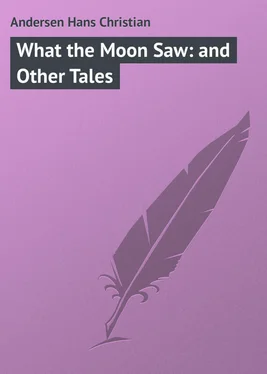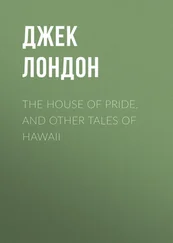Andersen Hans - What the Moon Saw - and Other Tales
Здесь есть возможность читать онлайн «Andersen Hans - What the Moon Saw - and Other Tales» — ознакомительный отрывок электронной книги совершенно бесплатно, а после прочтения отрывка купить полную версию. В некоторых случаях можно слушать аудио, скачать через торрент в формате fb2 и присутствует краткое содержание. Жанр: foreign_prose, на английском языке. Описание произведения, (предисловие) а так же отзывы посетителей доступны на портале библиотеки ЛибКат.
- Название:What the Moon Saw: and Other Tales
- Автор:
- Жанр:
- Год:неизвестен
- ISBN:нет данных
- Рейтинг книги:5 / 5. Голосов: 1
-
Избранное:Добавить в избранное
- Отзывы:
-
Ваша оценка:
- 100
- 1
- 2
- 3
- 4
- 5
What the Moon Saw: and Other Tales: краткое содержание, описание и аннотация
Предлагаем к чтению аннотацию, описание, краткое содержание или предисловие (зависит от того, что написал сам автор книги «What the Moon Saw: and Other Tales»). Если вы не нашли необходимую информацию о книге — напишите в комментариях, мы постараемся отыскать её.
What the Moon Saw: and Other Tales — читать онлайн ознакомительный отрывок
Ниже представлен текст книги, разбитый по страницам. Система сохранения места последней прочитанной страницы, позволяет с удобством читать онлайн бесплатно книгу «What the Moon Saw: and Other Tales», без необходимости каждый раз заново искать на чём Вы остановились. Поставьте закладку, и сможете в любой момент перейти на страницу, на которой закончили чтение.
Интервал:
Закладка:
"'I shall read yours also,' said Mæcenas; 'but to speak honestly – you know I never hide my opinion from you – I don't expect much from it, for you are much too wild, too fantastic. But it must be allowed that, as a man, you are highly respectable.'
"A young girl sat in a corner; and she read in a book these words:
"'In the dust lies genius and glory,
But ev'ry-day talent will pay .
It's only the old, old story,
But the piece is repeated each day.'"
Thirteenth Evening
The Moon said, "Beside the woodland path there are two small farmhouses. The doors are low, and some of the windows are placed quite high, and others close to the ground; and whitethorn and barberry bushes grow around them. The roof of each house is overgrown with moss and with yellow flowers and houseleek. Cabbage and potatoes are the only plants cultivated in the gardens, but out of the hedge there grows a willow tree, and under this willow tree sat a little girl, and she sat with her eyes fixed upon the old oak tree between the two huts.
"It was an old withered stem. It had been sawn off at the top, and a stork had built his nest upon it; and he stood in this nest clapping with his beak. A little boy came and stood by the girl's side: they were brother and sister.
"'What are you looking at?' he asked.
"'I'm watching the stork,' she replied: 'our neighbours told me that he would bring us a little brother or sister to-day; let us watch to see it come!'
"'The stork brings no such things,' the boy declared, 'you may be sure of that. Our neighbour told me the same thing, but she laughed when she said it, and so I asked her if she could say 'On my honour,' and she could not; and I know by that that the story about the storks is not true, and that they only tell it to us children for fun.'
"'But where do the babies come from, then?' asked the girl.
"'Why, an angel from heaven brings them under his cloak, but no man can see him; and that's why we never know when he brings them.'
"At that moment there was a rustling in the branches of the willow tree, and the children folded their hands and looked at one another: it was certainly the angel coming with the baby. They took each other's hand, and at that moment the door of one of the houses opened, and the neighbour appeared.
"'Come in, you two,' she said. 'See what the stork has brought. It is a little brother.'
"And the children nodded gravely at one another, for they had felt quite sure already that the baby was come."
Fourteenth Evening
"I was gliding over the Lüneburg Heath," the Moon said. "A lonely hut stood by the wayside, a few scanty bushes grew near it, and a nightingale who had lost his way sang sweetly. He died in the coldness of the night: it was his farewell song that I heard.
"The morning dawn came glimmering red. I saw a caravan of emigrant peasant families who were bound to Hamburgh, there to take ship for America, where fancied prosperity would bloom for them. The mothers carried their little children at their backs, the elder ones tottered by their sides, and a poor starved horse tugged at a cart that bore their scanty effects. The cold wind whistled, and therefore the little girl nestled closer to the mother, who, looking up at my decreasing disc, thought of the bitter want at home, and spoke of the heavy taxes they had not been able to raise. The whole caravan thought of the same thing; therefore, the rising dawn seemed to them a message from the sun, of fortune that was to gleam brightly upon them. They heard the dying nightingale sing: it was no false prophet, but a harbinger of fortune. The wind whistled, therefore they did not understand that the nightingale sung, 'Fare away over the sea! Thou hast paid the long passage with all that was thine, and poor and helpless shalt thou enter Canaan. Thou must sell thyself, thy wife, and thy children. But your griefs shall not last long. Behind the broad fragrant leaves lurks the goddess of Death, and her welcome kiss shall breathe fever into thy blood. Fare away, fare away, over the heaving billows.' And the caravan listened well pleased to the song of the nightingale, which seemed to promise good fortune. Day broke through the light clouds; country people went across the heath to church: the black-gowned women with their white head-dresses looked like ghosts that had stepped forth from the church pictures. All around lay a wide dead plain, covered with faded brown heath, and black charred spaces between the white sand hills. The women carried hymn books, and walked into the church. Oh, pray, pray for those who are wandering to find graves beyond the foaming billows."
Fifteenth Evening
"I know a Pulcinella," 3 3 The comic or grotesque character of the Italian ballet, from which the English "Punch" takes his origin.
the Moon told me. "The public applaud vociferously directly they see him. Every one of his movements is comic, and is sure to throw the house into convulsions of laughter; and yet there is no art in it all – it is complete nature. When he was yet a little boy, playing about with other boys, he was already Punch. Nature had intended him for it, and had provided him with a hump on his back, and another on his breast; but his inward man, his mind, on the contrary, was richly furnished. No one could surpass him in depth of feeling or in readiness of intellect. The theatre was his ideal world. If he had possessed a slender well-shaped figure, he might have been the first tragedian on any stage: the heroic, the great, filled his soul; and yet he had to become a Pulcinella. His very sorrow and melancholy did but increase the comic dryness of his sharply-cut features, and increased the laughter of the audience, who showered plaudits on their favourite. The lovely Columbine was indeed kind and cordial to him; but she preferred to marry the Harlequin. It would have been too ridiculous if beauty and ugliness had in reality paired together.
"When Pulcinella was in very bad spirits, she was the only one who could force a hearty burst of laughter, or even a smile from him: first she would be melancholy with him, then quieter, and at last quite cheerful and happy. 'I know very well what is the matter with you,' she said; 'yes, you're in love!' And he could not help laughing. 'I and Love!' he cried, 'that would have an absurd look. How the public would shout!' 'Certainly, you are in love,' she continued; and added with a comic pathos, 'and I am the person you are in love with.' You see, such a thing may be said when it is quite out of the question – and, indeed, Pulcinella burst out laughing, and gave a leap into the air, and his melancholy was forgotten.
"And yet she had only spoken the truth. He did love her, love her adoringly, as he loved what was great and lofty in art. At her wedding he was the merriest among the guests, but in the stillness of night he wept: if the public had seen his distorted face then, they would have applauded rapturously.
"And a few days ago, Columbine died. On the day of the funeral, Harlequin was not required to show himself on the boards, for he was a disconsolate widower. The director had to give a very merry piece, that the public might not too painfully miss the pretty Columbine and the agile Harlequin. Therefore Pulcinella had to be more boisterous and extravagant than ever; and he danced and capered, with despair in his heart; and the audience yelled, and shouted ' bravo, bravissimo! ' Pulcinella was actually called before the curtain. He was pronounced inimitable.
"But last night the hideous little fellow went out of the town, quite alone, to the deserted churchyard. The wreath of flowers on Columbine's grave was already faded, and he sat down there. It was a study for a painter. As he sat with his chin on his hands, his eyes turned up towards me, he looked like a grotesque monument – a Punch on a grave – peculiar and whimsical! If the people could have seen their favourite, they would have cried as usual, ' Bravo, Pulcinella; bravo, bravissimo! '"
Читать дальшеИнтервал:
Закладка:
Похожие книги на «What the Moon Saw: and Other Tales»
Представляем Вашему вниманию похожие книги на «What the Moon Saw: and Other Tales» списком для выбора. Мы отобрали схожую по названию и смыслу литературу в надежде предоставить читателям больше вариантов отыскать новые, интересные, ещё непрочитанные произведения.
Обсуждение, отзывы о книге «What the Moon Saw: and Other Tales» и просто собственные мнения читателей. Оставьте ваши комментарии, напишите, что Вы думаете о произведении, его смысле или главных героях. Укажите что конкретно понравилось, а что нет, и почему Вы так считаете.












